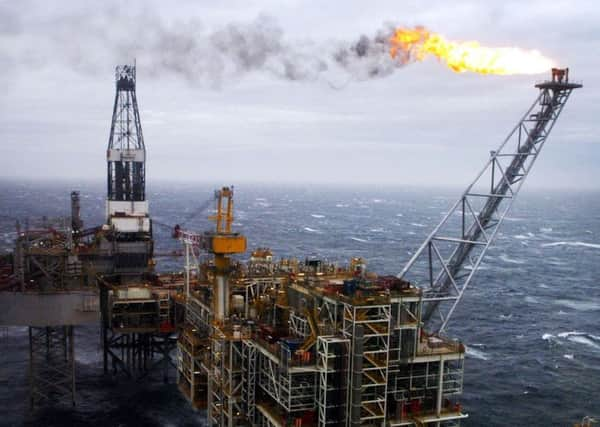Scots economy '˜facing lost decade' as growth stays weak


The grim prospect of the country slipping into recession next week now “hangs in the balance”, when updated economic figures are set to be released.
Flatlining growth over the past two years can no longer be blamed on the global oil and gas slump which has battered the North Sea industry, according to the respected Fraser of Allander Institute.
Advertisement
Hide AdAdvertisement
Hide AdOpposition leaders blamed uncertainty over a second referendum after the report indicated this may have been a factor in the slowdown.
The Scottish economy is predicted pick up in 2017, although the institute’s forecasts for growth of 1.2 per cent, then 1.4 per cent next year, followed by 1.6 per cent in 2019 are below that expected in the rest of the UK.
Graeme Roy, director of the Fraser of Allander Institute, said: “The Scottish economy continues to lag behind the UK as a whole, with the scale of the gap growing rather than narrowing. On balance, our forecast is that growth will return in 2017, with tentative signs of a more positive outlook for Scotland’s oil and gas sector and improving order books across Scottish businesses.
“In the current climate, sentiment can change quickly. Should the upcoming Brexit negotiations go badly, or the UK economy slows down more quickly than anticipated, then Scotland’s economic prospects could take a sharp turn for the worse.”
He added: “Coming on the back of little growth in real earnings since the financial crisis, for many households it will feel like a ‘lost decade’.”
Next week’s Scottish GDP figures for the first quarter of 2017 will confirm whether or not the Scottish economy has formally re-entered recession. It comes after the economy shrank in the final three months of 2016. A recession is defined as two successive quarters of negative growth.
Of broader concern, according to the experts, is that the slowdown seems to have spread across a wider set of industrial sectors than was previously the case. In the last quarter of 2016, activity in the manufacturing and construction sectors fell, while services did not grow at all.
The report says that the divergence between the UK and Scots economies make it “hard to argue” that Brexit is the cause of the slump north of the Border.
Advertisement
Hide AdAdvertisement
Hide AdIt adds: “Moreover, services – around 75 per cent of the economy and less exposed to external conditions – grew nearly twice as fast in the UK as in Scotland last year.
“Others have argued that the prospects for a second independence referendum may be having an impact, although there is little robust data to formally test this hypothesis (and indicators of international investment remain positive).
“Taken together, though, it is possible to argue that such effects may have had a greater cumulative effect on Scotland, especially to confidence.”
Scotland’s productivity growth remains weak, and with inflation likely to rise above 3 per cent in the coming months, the outlook for household finances also looks grim.
Conservative finance spokesman Murdo Fraser called on the Scottish Government to use its new tax-raising powers over income tax rates and bands to help boost growth.
“The continuing under-performance of Scotland’s economy will adversely impact the spending the Scottish Government will have,” he said. “Holyrood’s new powers means that Scotland’s economic performance matters more than ever before.”
Economy Secretary Keith Brown said the report showed growth will continue next year and said that unemployment is also at record low levels.
He said: “While challenges remain, the report also confirms emerging signs of confidence returning to the oil and gas sector, building on recent reports from Bank of Scotland and Aberdeen and Grampian Chamber of Commerce. While these signs are encouraging, we must be clear that the biggest threat to Scotland’s economy continues to be Brexit.”
Advertisement
Hide AdAdvertisement
Hide AdLabour’s economy spokesperson Jackie Baillie said: “Scotland is teetering on the brink of recession because Nicola Sturgeon has been more interested in running a campaign for a second independence referendum than running a government. Ministers must take their heads out of the sand and stop being complacent.”
